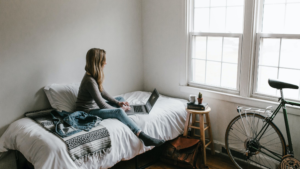Today’s freelance interview is Black hair and beauty writer, Keysha Davis. As Keysha shares the same niche as me, it’s a pleasure to interview her and find out the tips she has as a veteran in the field.
1. What influenced you to become a freelance writer?
In all honesty, I became interested in a freelance career after becoming a mother. During the early days of motherhood when my son was susceptible to picking up colds and sniffles from nursery and school, I would find myself having to take time off work every so often. The situation was so stressful. Working as part of a small editorial team and working to close deadlines, meant that you had to really pay the price whenever you took unscheduled time off. I used to sit at my desk and daydream about a freelance career where I could set my own hours, and take time off for emergencies without being saddled with guilt. It’s turned out to be everything I imagined it would be and I’m so glad I made that leap.
2. Are you a full time or part-time writer?
It varies. On some weeks I may only work 2-3 days a week, but during busier periods I can easily find myself working 6-7 days per week, so it’s hard to say really. I think my ultimate aim though is to work no more than three days a week.
3. How long have you been freelancing?
Almost 3 years.
4. What publications do you freelance for?
I’m now mainly a copywriter for hair and beauty brands who occasionally works for publications including Spell, The Independent, Black Beauty & Hair, Glamour, Hairdresser’s Journal, and Dare (Superdrug magazine). I’ve also started recently started working for startups with dedicated content sections, which has been really exciting.
5. Do you think it’s important to have a niche?
Yes, definitely. Having a niche strengthens your position in the marketplace. When someone is looking to hire a writer in a specific field, they will approach you automatically if you have a strong body of work in that field. Prior to working in beauty, I was a feature and entertainment editor for Pride magazine. I attempted to go freelance in 2010 but because I didn’t have a strong enough niche and wasn’t renowned in any particular area, I really found it difficult to get my feet off the ground and I only lasted for around four months before going back into a full-time position. That said, I would also add that it’s fine to dabble in other areas of interest but having a strong niche will bag you the regular commissions from the most unexpected sources.
6. What would you describe your niche as?
My niche is hair and beauty specifically written from the perspective of a black woman.
7. What resources have you found useful as a freelancer?
I find social media is the best place to source work, particularly Facebook, Instagram, and Twitter. Try and find suitable groups, pages, and hashtags and read through regularly. I’ve also signed up for a few freelance newsletters such as Freelance Writing Jobs by Sian Meades and Hair Rollers in London by Jessica Evans.
8. How did you become a freelancer?
Although I’ve been wanting to freelance for many years, I was really scared to take the plunge after failing in 2010. It was only after becoming redundant I decided to try again, and thankfully it worked on this occasion. So, it wasn’t at all strategic, I just took a leap of faith, and here I am today.
9. What method do you find most useful in finding clients?
I’ve been truly blessed in my freelance career so far – most of my clients come from word of mouth. Having worked in the beauty industry for over 10 years now, I have developed a solid reputation, and as such commissioning editors, brand managers, and business owners often approach me to write copy, which again goes back to my earlier point about the importance of developing a niche.
10. What do you like most about freelancing?
Definitely the freedom it affords you. I don’t have to stick to a Monday-Friday 9-5 paradigm, work at my own pace, choose the people I want to work with and my earning potential isn’t capped by a set salary.
11. What challenges have you found with freelancing, and how do you battle through them?
I would say the hardest part about freelancing is chasing invoices. Thankfully I have a few regular clients who pay a retainer fee, which definitely provides a safety blanket, but for the clients who pay on an ad hoc basis, sometimes that will result in having to spend weeks chasing money owed and it can be very frustrating and stressful.
12. What tips do you have for those wanting to do freelancing or build their own business?
Use resources that are readily available such as LinkedIn, Twitter, and Instagram. Sign up to newsletters and job sites that advertise freelance jobs such as indeed.co.uk. You’ll also find Facebook groups created for freelancers such as No.1 Freelance Media Women – there literally are so many sources available to help you land regularly writing gigs. And don’t be afraid to reach out to businesses you see online that may be struggling in the communications department and potentially require a content writer. For instance, if there’s a business account you follow on Instagram whose posts are poorly written or they are inconsistent with posting, there’s no harm in dropping them a DM to find out if they are in the position to hire you to take care of their content needs. There are so many opportunities out there, keep your eyes and ears open, and get ready to take action when they appear.
13. What 3 words would you describe your freelance work as?
Fast-paced, creative, fun.
14. What do you like to do in your spare time?
I love to read books (memoirs are my fave) and my passion is attending live events such as concerts and the theatre. Unfortunately, there hasn’t been the opportunity to do much of that this year for obvious reasons.
15. How do you find the work/ life balance being a freelancer? Do you have any tips for this area?
I think it’s about setting your own personal boundaries, and only you will know what works best for you. My personal rules are no work emails after 5pm and I really do try to refrain from working on weekends, although sometimes I find myself having to.
16. What key characteristics are needed to become a freelancer?
Resilience, flexibility, the ability to juggle many tasks at once, and a tough skin that’s able to take rejection, or take it on the chin when a client no longer requires your services and drops you with any warning. It’s definitely not for the faint hearted or for those who crave stability.
17. What is the proudest project you have worked on?
I’m just proud that my work allows me to celebrate and shine a spotlight on the beauty of black women across the globe, and they see themselves reflected in a positive light.
If you are looking for exclusive content like a bi-monthly newsletter to help you on your freelance creative journey, you can sign up for my Patreon.


